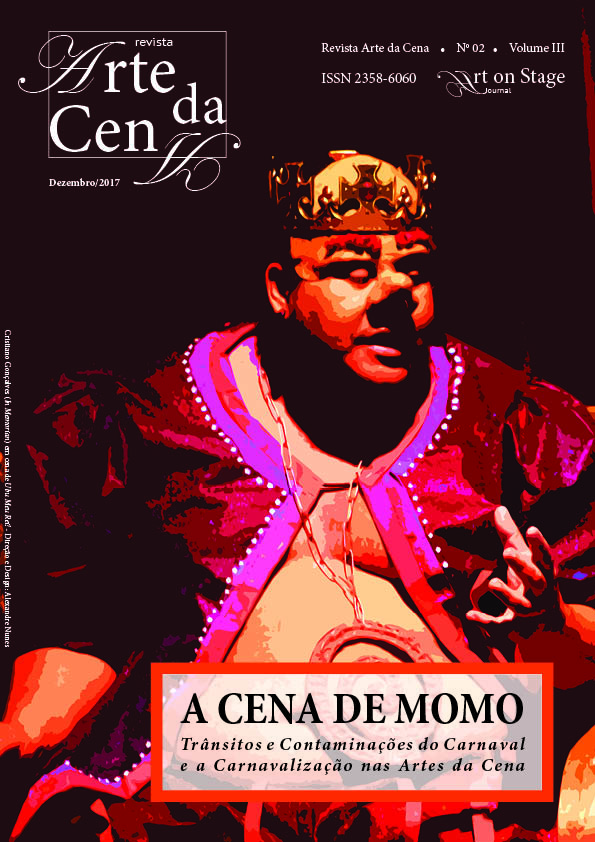The Body Technique in Dance: Epistemological Resizing
DOI:
https://doi.org/10.5216/ac.v3i2.48866Keywords:
dança, corpo, técnica corporal, subjetividade.Abstract
In this article, I demarcate an area of debate within the theoretical eld of dance, organizing a thought around the question of the body in its technical- creative dimension. I present brie y the tendencies present in the current debate on subjectivity and the notion of subject. en I will critique some of the present statements in the pedagogical discourse of dance today, where I will try to denounce the tendency towards certain binary oppositions between conditioning/freedom or reproduction/creation. I approach the concept of “body techniques” by Marcel Mauss, and then point out articulations between this author and the debate about the subject in contemporary cultural theory.
Downloads
References
ANDREOLI, Giuliano S. Dança, Gênero e Sexualidade: um olhar cultural. Conjectura, v.15, n.1, jan/abr, 2010.
BOURDIEU, Pierre Questions de sociologie. Paris: Les Éditions de Minuit, 1984.
BUTLER, Judith. Problemas de gênero: feminismo e subversão da identidade. Rio de Janeiro: Civilização Brasileira, 2003.
BUTLER, Judith. Relatar a si mesmo: crítica da violência ética. Belo Horizonte: Autêntica Editora, 2015.
DA MATTA, Roberto. Individualidade e liminaridade: considerações sobre os ritos de passagem e a modernidade. Mana. 6 (10), 7-29, 2000.
DANTAS, Monica. Movimento: matéria prima e visibilidade da dança. Movimento. Ano IV, n°6, 1997/1
DOUGLAS, Mary. Natural Symbols. Harmondsworth: Penguin. 1973.
ELIAS, Norbert. O Processo Civilizador: Uma história dos costumes. v. 1. Rio de Janeiro: Jorge Zahar,1994.
FERNANDES, Ciane. Quando o Todo é mais que a Soma das Partes: somática como campo epistemológico contemporâneo Rev. Bras. Estud. Presença, Porto Alegre, v. 5, n. 1, p. 9-38, jan./abr. 2015.
FORTIN, Sylvie. L’education somatic et la formation en danse. Nouvelles de Danse. Bruxelas : Contradanse, n.. 28, p. 15-30, 1996.
FORTIN, Sylvie; VIERIA, Adriane; TREMBLAY, Martyne. A experiência de discursos na dança e na educação somática. Movimento, vol. 16, núm. 2, abril-junho, 2010, pp. 71-91. Universidade Federal do Rio Grande do Sul, Porto Alegre, Brasil.
FOUCAULT, Michel. A História da Sexualidade I: A vontade de Saber. Rio de Janeiro. Graal. 2003.
GEERTZ, Clifford. The interpretation of cultures. New York: Basic Books, 1973.
GIDDENS, Anthony. Central problems in social theory: action, structure and contradiction in social analysis. Berkeley: University of California Press, 1979.
GOFFMAN, Irving. A representação do eu na vida cotidiana. Petrópolis. Vozes. 2009.
GREEN, Jill. Somatic Knowledge: the body as content and methodology in dance. Journal of Dance Education. New Jersey, v.. 2, n.. 4, p. 114-118, 2002.
GUARATTO, Rafael. Por um conceito de “Danças Populares”. Dança, Salvador, v. 3, n. 1, p. 61-74, jan./jul. 2014
HALL, Stuart. A centralidade da Cultura: notas sobre as revoluções culturais de nossos tempos. Educação & Realidade, Porto Alegre, v. 22, nº2, p. 15-46, jul./dez.1997
IANNITELLI. Leda Maria M. Técnica da dança: redimensionamentos metodológicos. Revista Repertório. Ano 7. n°7. Universidade Federal da Bahia. Programa de Pós-Graduação em Artes Cenicas. Salvador. 2004.
KATZ, Helena. Um, dois, três, a dança é o pensamento do corpo. São Paulo : PUC/SP, 1994. Tese (Doutorado em Comunicação e Semiótica) Pontifícia Universidade Católica de São Paulo.
LANGUER, Susane. Sentimento e forma. São Paulo: Perspectiva, 1980.
LAWER, Steph. ‘Masquerading as ourselves: Self-Impersonation and Social Life’. In: Identity: Sociological Perspectives. Polity Press; 1 edition, 2007.
LOUPPE, Laurence. L’utopie du corps indéterminé. In : ASLAN, Odette (Org.). Le corps em jeu. Paris: CNRS Editions, 1994.
MARQUES, I. A dança no contexto: Uma proposta para a educação contemporânea. São Paulo: Faculdade de Educação da Universidade de São Paulo, 1996. Tese (Doutorado em Educação) Faculdade de Educação - USP, 1996.
MARQUES, Isabel .A. Ensino da dança hoje: Textos e contextos. São Paulo: Cortez. 1999.
MAUSS, Marcel. “As técnicas corporais”. In: . Sociologia e Antropologia. vol. 2. São Paulo: E.P.U./EDUSP, 1974.
ORTNER, Sherry. Subjetividade e Crítica Cultural. Horizontes Antropológicos. vol.13 no.28 Porto Alegre July/Dec. 2007.
PINEAU, Elyse L. Nos cruzamentos entre a performance e a pedagogia: uma revisão prospectiva. Educação e Realidade. Porto Alegre. V.35. n°2. P.89-113. 2010.
RODRIGUES, Rogério. Sociedade, corpo e interdições: contribuições do estudo de Marcel Mauss sobre as técnicas do corpo. Revista Brasileira de Ciências do Esporte. n°21. Jan/mai, 2000. p.65-70.
SASTRE, Cibele. Entre o performar e o aprender: práticas performativas, dança, improvisação e análise Laban/Bartenief. Universidade Federal do Rio Grande do Sul, Faculdade e Educação, Programa de Pós-Graduação em Educação. Porto Alegre. BR-RS, 2015.
VELHO, Gilberto. (2003). Projeto e metamorfose: antropologia das sociedades complexas (3a ed.). Rio de Janeiro: Jorge Zahar Ed.
VELHO, Gilberto. Individualismo e Cultura. 8° ed. Rio de Janeiro: Jorge Zahar Editor, 2008.
WEBER, Max. The protestant ethic and the spirit of capitalism. Trad. T. Parsons. New York: Scribners, 1958.
Downloads
Published
How to Cite
Issue
Section
License
The Art on Stage Journal uses the Creative Commons - Attribution-Non-Commercial 4.0 International license as a basis for transferring rights, for open access journals (Open Archives Initiative - OAI).
Authors who publish in this journal agree with the following terms:
1) Authors retain the copyright and grant the Art on Stage Journal the right to first publication, with the work simultaneously licensed under the Creative Commons Attribution Non Commercial License.
2) Authors are authorized to assume additional contracts separately, for non-exclusive distribution of the version of the work published in this Journal (eg, publishing in institutional repository or as a book chapter), with acknowledgment of authorship and initial publication in this journal.
3) Authors are allowed and encouraged to publish and distribute their work online (eg in institutional repositories or on their personal page) at any point before or during the editorial process, provided that the reference to the place of publication is cited, that is, the electronic address / reference of Art on Stage Journal.
4) The authors of the works published in the Art on Stage are expressly responsible for their content.
5) Authors will not be paid for publication of works in the Art on Stage Journal.



